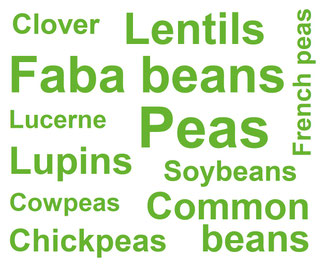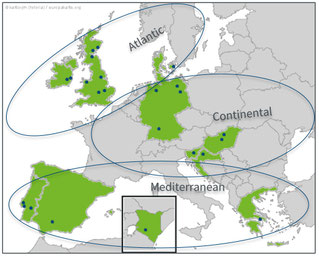- About TRUE
- Consortium
- James Hutton Institute
- Coventry University
- Stockbridge Technology Centre
- Scotland's Rural College
- Kenya Forestry Research Institute
- Catholic University of Portugal
- University of Hohenheim
- Agricultural University of Athens
- Institute for Food Studies & Agro industrial Development ApS
- Public Institution for the Development of the Međimurje County REDEA
- Bangor University
- Trinity College Dublin
- The Processors and Growers Research Organisation
- Jožef Stefan Institute
- IGV Institut für Getreideverarbeitung
- Environmental Social Science Research Group
- Agri Kulti Ltd.
- Alfred-Wegener-Institute, Helmholtz-Centre for Polar and Marine Research
- Slow Food Deutschland e.V.
- Arbikie Distilling Ltd.
- Teagasc - the Agriculture and Food Development Authority
- Herdade do Freixo do Meio
- Eurest
- Solintagro S.L.
- ISAB
- Consortium
- Work Packages
- Legume Innovation Network
- LIN - Workshops
- Blog: "Notes from the field"
- News & Events
- Publications & Resources
- Contact
WP2: Case Studies
Work Package 2 aims to determine and demonstrate the factors that contribute to successful transitions using a network of stakeholders among farming, food producers and consumers. Methods include characterisation of food and feed chain networks through a set of 24 Case Studies, forming Legume Innovation Networks covering Europe’s pedo-climatic zones. Most effective transition paths will be identified to derive principles for wider application.

There are many different types of legumes involved in the different case studies. The text size is related to the number of different case studies with this legume.
Atlantic Cluster - Case Studies
CS 1: Expanding legume based pasture uptake (Teagasc, Ireland)
CS 2: Clover-sward reliant organic production (Teagasc, Ireland)
CS 3: Intercrops for food & feed (Arbikie Distilling Ltd./Barney's Beer, UK)
CS 4: Self-sufficiency - novel rotation (Scotland's Rural College, UK)
CS 5: Legume intercrops for forage or biomass (James Hutton Institute, UK)
CS 6: Precision Agriculture Technologies: living mulches for cereal production (STC/Manterra, UK)
CS 7: Heritage varieties for enhanced human and beneficial insect nutrition
(Coventry University, UK)
CS 8: Using legumes as a source of fertility in organic protected cropping systems
(Coventry University, UK)
CS 9: Retailer-producers quality chain length (IFAU, Denmark)
CS 10: Market model development for organic pork (IFAU, Denmark)
CS 11: Characterise vegetarian foods quality chain (IFAU, Denmark)
CS 12: Vegetarian food formulation (IFAU, Denmark)
Continental Cluster - Case Studies
CS 13: Assess structure/profit short supply chains - grain products (University of Hohenheim, Germany)
CS 14: Assess structure/profit short supply chains - Tofu, feed (University of Hohenheim, Germany)
CS 15: Organic lupins for aquaculture feeds (Alfred-Wegener-Institut, Germany)
CS 16: Policy for sustainable development (Regionalna Razvojna Agencija Medimurje, Croatia)
CS 17: Sustainable short supply chains delivering novel legume products to reconnect producers and urban consumers (Agri Kulti Kft., Hungary)
Mediterranean Cluster - Case Studies
CS 18: Ancient & heritage variety screening for higher nutritive value (Sociedade Agrícola do Freixo do Meio, Portugal)
CS 19: Consumers - legume dishes (Eurest -Sociedade Europeia De Restaurantes Lda., Portugal)
CS 20: Processors - snack and convenience foods (Universidade Catolica Portuguesa/Palmeiro Foods, Portugal)
CS 21: Novel grafted types - high yield (Agricultural University of Athen, Greece)
CS 22: Elite inoculum - inc. yield & profit (Agricultural University of Athens, Greece)
CS 23: Breeding for high production and NUE Mediterranean agroecological pedoclimatic stresses (Solintagro SL, Spain)
CS 24: Silvo-arable production & quality chain characterisation (Kenya Forestry Research Institute, Kenya)
Objectives
Task 2.1
Translation to regions where successes have yet to be realised, considering infrastructural constraints
Task 2.2
Enable KE&C to other developing EU scenarios (e.g. Croatia)
Task 2.3
Showcase the integration of legumes in a profitable, sustainable and health promoting manner, identifying successful transition factors
Deliverables
D2.1
Creation of Data Resource Centre
D2.2
Submit DMP, database populated annually
D2.3
Data to institutional repository (ORDP)
D2.4
Case Study documents

TRansition paths to sUstainable legume-based systems in Europe (TRUE) has received funding from the
European Union’s Horizon 2020 research and innovation programme under grant agreement No. 727973
Search content on this website by typing a keyword:













